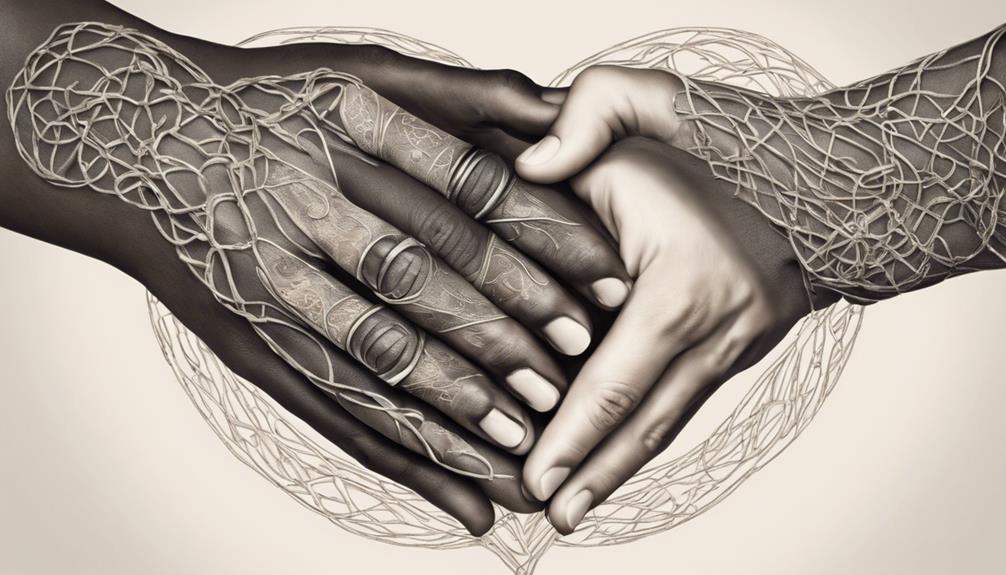Exploring different types of relationships enables us to understand the intricacies of human connections.
Ethical non-monogamy offers a unique perspective on intimate relationships, challenging traditional norms.
As we explore the nuances of various non-monogamous structures, we uncover a world where communication, consent, and mutual respect reign supreme.
This exploration into diverse relationship types not only broadens our understanding of love but also invites us to reconsider the boundaries of commitment and fidelity in ways that may surprise you.
Key Takeaways
- Open relationships prioritize commitment and allow for engaging with others while maintaining a primary partnership.
- Polyamory emphasizes emotional connections with multiple partners through consent and communication.
- Swinging involves partner exchanges for sexual activities with clear rules and boundaries for safe exploration.
- Various relationship structures within ethical non-monogamy highlight consent, communication, and respect for diverse partnership choices.
Types of Ethical Non-Monogamy
Exploring the diverse landscape of ethical non-monogamy opens the door to a spectrum of relationship types that cater to varying preferences and dynamics. In this realm, we encounter various relationship structures such as open relationships, polyamory, swinging, casual dating, and more.
Open relationships prioritize commitment while allowing partners to engage in intimate relationships with others, fostering trust and communication. Polyamory, on the other hand, involves having multiple partners with the consent of everyone involved, emphasizing deep emotional connections and often creating extended family-like structures. Swinging offers couples the opportunity to exchange partners for sexual activities, all while maintaining their primary relationship as the foundation.
Each of these relationship types within ethical non-monogamy brings a unique set of values and boundaries, highlighting the importance of consent, communication, and respect for all individuals involved. Whether seeking multiple partners or exploring different levels of commitment, ethical non-monogamy provides a space for diverse relationship dynamics to flourish.
Polygamy

Polygamy, the practice of having multiple spouses, is a relationship structure that's recognized in certain cultures and religions. Within polygamous relationships, there exist variations such as polygyny, where one man has multiple wives, and polyandry, where one woman has multiple husbands. Unlike polyamory, polygamy often involves legal marriages or recognized partnerships with multiple individuals. While some countries have laws prohibiting polygamy, others legally acknowledge specific forms of these unions. The practice of polygamy may stem from cultural, religious, or personal motivations, with historical examples found in diverse societies globally.
Polygamy's historical presence underscores its significance in various communities, shaping social structures and familial dynamics. Understanding the nuances of polygamy, whether through legal lenses or cultural contexts, allows for a more comprehensive appreciation of the complexities involved. Recognizing the diversity of reasons behind polygamous relationships fosters empathy and respect for individuals who choose this form of partnership.
Swinging
Swinging, a liberating expression of consensual intimacy, allows couples to explore sexual adventures beyond traditional boundaries with mutual understanding and respect. In this form of ethical non-monogamy, partner swapping and engaging in group sex are common ways to delve into sexual exploration within the safety of established boundaries. Attending swinger parties offers a space for like-minded individuals to connect and indulge in shared experiences, fostering an environment built on trust and communication.
Setting clear guidelines and rules is essential in swinging relationships to ensure all parties involved feel safe and respected. By prioritizing open communication and trust, couples can navigate this unique dynamic with a focus on enhancing intimacy and pleasure. Through swinging, couples have the opportunity to strengthen their bond while satisfying their curiosity and desires in a consensual and respectful manner. This shared journey of exploration can lead to deeper connections and a heightened sense of trust within the primary relationship.
Open Relationships

Open relationships involve a dynamic form of committed partnership where both individuals consent to engaging in sexual activities with others, emphasizing honesty, communication, and clear boundaries to foster trust and mutual understanding. In this type of relationship, exploring connections beyond the primary partnership is ethical, provided it's done with respect and open communication.
Here are some key points to understand about open relationships:
- Consent is Key: All partners must willingly agree to the arrangement and continuously communicate their boundaries and comfort levels.
- Honesty and Transparency: Open relationships thrive on open and honest communication about desires, emotions, and any concerns that may arise.
- Establishing Clear Boundaries: Setting boundaries is crucial to ensure that all parties feel secure and respected within the relationship.
- Building Trust: Trust forms the foundation of open relationships, allowing partners to feel safe and supported in their exploration of connections outside the primary partnership.
Navigating the complexities of an open relationship requires a deep understanding of your partner's needs and emotions, making communication and trust essential pillars for success.
Polyamory / Polyfidelity
Navigating the intricacies of maintaining multiple romantic relationships simultaneously requires a deep commitment to open communication, honesty, and transparency among all parties involved in polyamory and polyfidelity. In polyamory, individuals engage in multiple romantic relationships with the consent of all parties, emphasizing emotional connections and intimacy alongside physical aspects. Polyfidelity, a form of polyamory, involves multiple partners in an exclusive, committed relationship. Both polyamory and polyfidelity foster diverse relationship dynamics, encouraging individuals to explore connections based on mutual consent and respect.
Within these relationship structures, open communication is paramount to ensure everyone's needs and boundaries are understood. Honesty and transparency build trust and understanding, creating a foundation for strong, healthy relationships. Emotional connections are valued as highly as physical intimacy, allowing for a deep sense of closeness and fulfillment. By embracing the principles of polyamory and polyfidelity, individuals can cultivate meaningful connections with multiple partners while upholding respect, consent, and trust in their relationships.
Frequently Asked Questions
What Relationship Type Is Open to Exploring?
We believe that the relationship type open to exploring is an open relationship. It involves partners who maintain a primary connection while being open to forming relationships with others.
In this dynamic, communication and transparency are key as individuals engage in romantic or sexual interactions outside the primary partnership. The openness allows for personal growth and the fulfillment of various needs within the boundaries of mutual consent and respect.
What Is Ethical Non-Monogamy Relationship Type?
Ethical non-monogamy relationship type involves engaging in multiple simultaneous relationships with consent and honesty. It allows for exploring diverse dynamics beyond traditional monogamy.
Different types include polyamory, open relationships, swinging, polygamy, and more. Fundamental principles are consent, respect, and clear communication.
It's about mutual agreement and openness, distinguishing it from cheating. Embracing ENM can lead to deep connections and personal growth within a supportive framework.
What Are the Different Types of Enm?
We're happy to share!
In ethical non-monogamous relationships, a variety of types exist. For instance, polyamory allows for intimate connections with multiple partners simultaneously. Each type, whether polyamory, open relationships, swinging, polygamy, or polyfidelity, offers unique dynamics and opportunities for individuals seeking diverse relationship structures.
It's important to explore these options with open communication and respect for all parties involved.
Is ENM the Same as Swinging?
Yes, ENM isn't exactly the same as swinging. While swinging falls under the umbrella of ethical non-monogamy, it's more focused on recreational sex without emotional attachment.
ENM, on the other hand, encompasses various relationship styles beyond swinging, like polyamory and open relationships. It's all about consensual, honest connections that prioritize communication and respect.
Each ENM type offers unique dynamics and boundaries for those involved.
How Are Different Types of Non-Monogamous Relationships Explored in Ethical Non-Monogamy?
In ethical nonmonogamy, poly relationships allow for various nonmonogamous dynamics. These may include open relationships, polyamory, or swinging. Each type involves consensual and transparent agreements between partners and emphasizes communication and trust. Ethical nonmonogamy in poly relationships promotes respect and honesty among all parties involved.
Conclusion
As we journey through the diverse landscape of ethical non-monogamy relationship types, we discover the beauty of embracing love in its many forms.
Just like a garden with different flowers, each relationship style offers unique colors and fragrances that enrich our lives.
By nurturing trust, communication, and respect, we can cultivate flourishing connections that bring joy and fulfillment to all involved.
Let's continue to explore, learn, and grow together on this remarkable journey of love and understanding.









